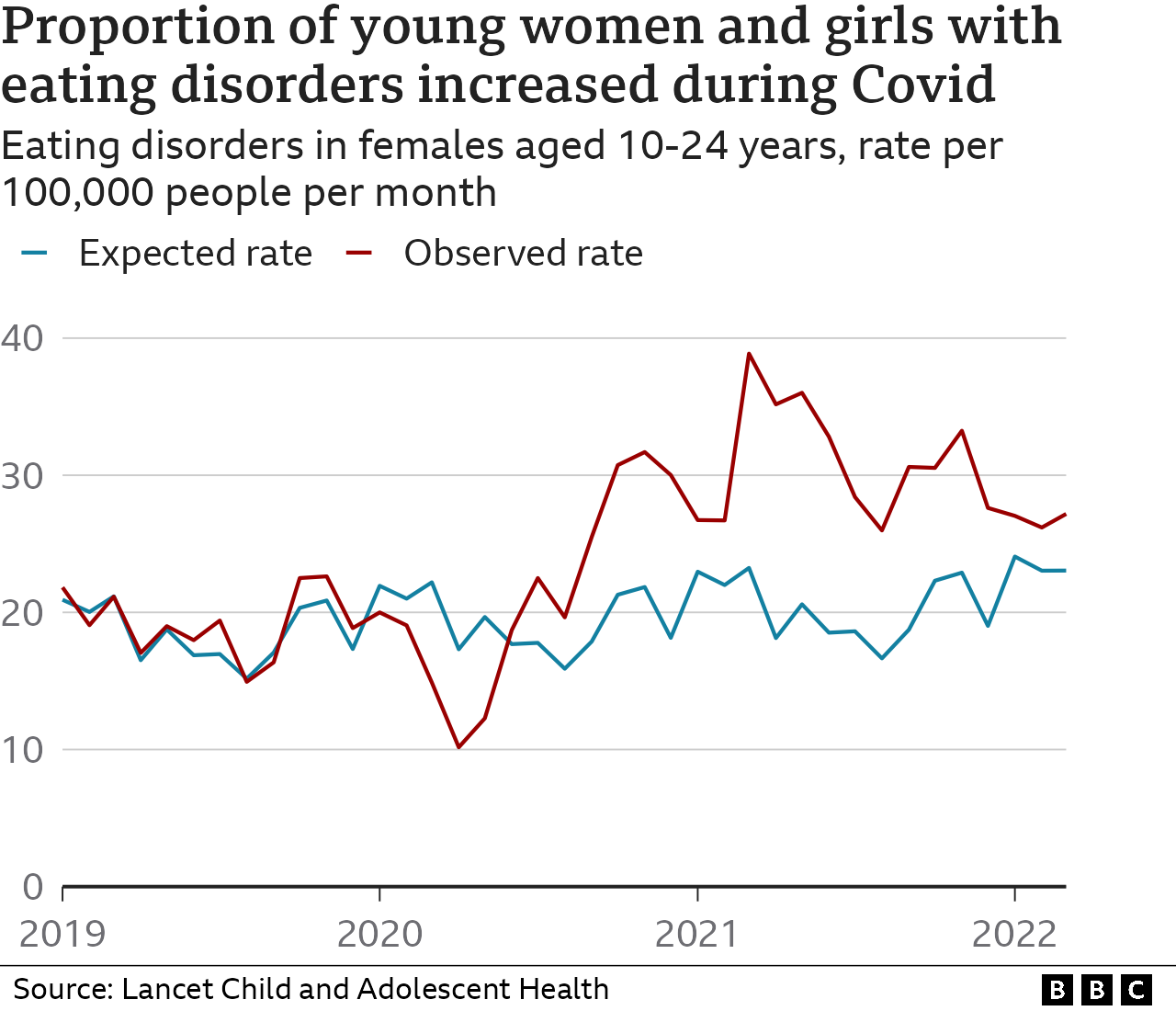

GP records show a sharp rise in teenage girls in the UK developing eating disorders and self-harming during the Covid pandemic, a study has found.
The increases were greatest among girls living in the wealthiest areas, which could be due to better GP access.
Young women have told the BBC that the lack of control over their lives during lockdown was a behavioural trigger.
The government says it is investing in eating disorders services to help more children and young people.
Charities maintain everyone needs access to early support for mental health issues, no matter where they live.
Annabelle, 19, from Surrey, recalls how difficult she found lockdown.
“We had very little control over our lives – our GCSEs were cancelled, we had no say in what our grades were going to be.
“We couldn’t see people, we couldn’t control where we went.
“The only thing we could control was what you ate and how you looked – so that’s what I chose to focus on.”
Annabelle received help overcoming bulimia and is feeling better, but her family is still paying for therapy privately.
She says people don’t realise how common eating disorders are: “I don’t know a single girl or female friend who hasn’t had some sort of struggle with eating.”
“It’s incredibly hard, but there isn’t enough help for everyone on the NHS.”

Sophie Rowland, 18, from South Shields, has been posting about her recovery from anorexia on TikTok.
She loved food before the pandemic, but being stuck in the house during lockdown made her obsessive about exercise and watching workouts online.
“I just realised I couldn’t stop tracking calories. It had taken over my life.”
“Everything was just food, food, food – and it was food that became the enemy.”
She told her mum one day, and says she was “very lucky” with the help she received from nurses, friends and family.
Positive feedback from her videos have also aided her recovery and now she wants to help others.
Eating disorders and self-harming have been rising among children and young people for a number of years but “increased substantially” between 2020 and 2022, the study found.
Over that period, around 2,700 diagnoses of eating disorders were anticipated among 13-16-year-olds, but 3,862 were actually observed – 42% more than the expected figure.
In the same age group, 6,631 cases of self-harm were expected but 9,174 were recorded by GPs – 38% more than predicted.
Among 17-19-year-olds eating disorders also rose above expectations.
The analysis, by the University of Manchester, Keele University and University of Exeter, looked at nine million records belonging to patients aged 10-24 years, from nearly 2,000 GP practices across the UK.
Dr Shruti Garg, from the University of Manchester – a child and adolescent psychiatrist and the study author – called it a “staggering rise” which highlighted an urgent need to improve early access to support.
An eating disorder – most commonly anorexia or bulimia – is a mental health condition where control over food is used as a means of coping with distress and other difficult situations.

During the pandemic, prolonged access to social media, more focus on body image and less face-to-face contact may have led to feelings of low self-esteem and psychological distress, particularly among adolescent girls, the study says.
Social media may also have exposed young people to content which increased the risk of developing an eating disorder.
In the media “there was a lot of emphasis on food availability and restriction, and also on the message that being overweight was a risk for Covid,” Dr Garg notes.
The research also suggests young people might self-harm as a coping strategy in times of uncertainty.
Even before the pandemic, there had been a gradual decline in mental health generally among teenagers and young people – and a recent study found five children in every classroom had a probable mental disorder in 2022.
Since March 2020, GP records show a big rise in eating disorders among the richest in the UK population – with 52% of flagged eating disorders occurring in the least deprived areas and 22% in the most deprived.
Tom Quinn, director of external affairs at charity Beat, says there is still “a postcode lottery” for care and everyone needs to get “the help they need as quickly as possible”.
“These figures are shocking but sadly not surprising,” he adds.
“We also know that the NHS is treating more children and young people than ever before, with healthcare professionals under huge amounts of strain.”
The study found no sign of increasing rates of eating disorders among boys or young men, but this is not the experience of charities. Researchers say males have a higher suicide risk than females, suggesting mental health issues manifest in different ways.
The charity YoungMinds says it is hearing more often about complex mental health cases where young people develop an eating disorder and experience other mental health issues, but are unable to find support when they need it.
Severe delays “can put them at risk of getting worse and reaching crisis before they get any help”, said Olly Parker, head of external affairs.
The research, which was supported by mental health research charity The McPin Foundation, is published in the Lancet Child and Adolescent Health.
A spokesperson for the Department of Health and Social Care said they recognised “the devastating impact eating disorders can have on an individual and [their] family’s life”.
The government says it will invest an additional £2.3 billion a year in NHS mental health services by March 2024, alongside £54m a year to increase capacity at children and young people’s community eating disorder services. – bbc.com